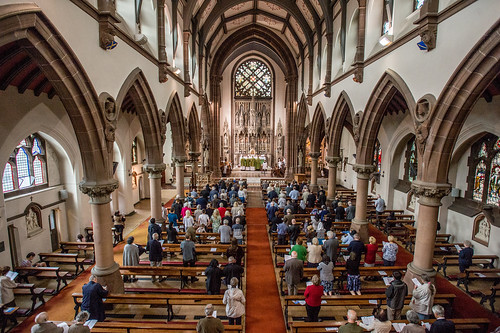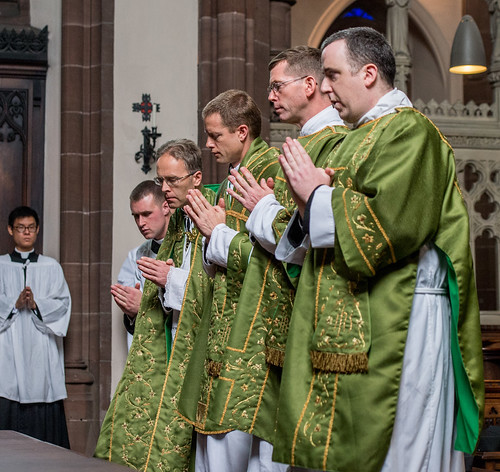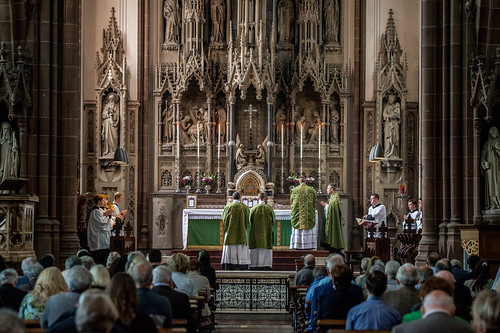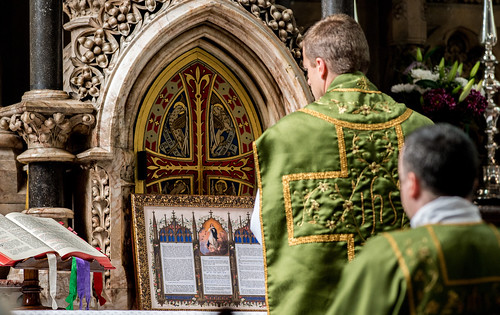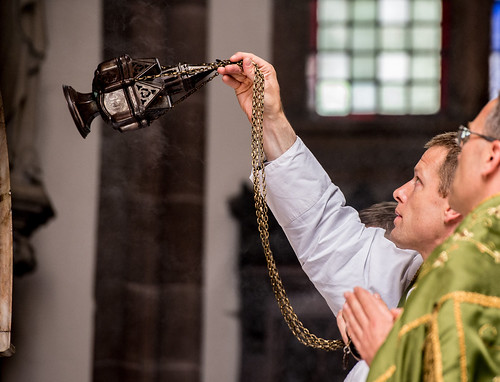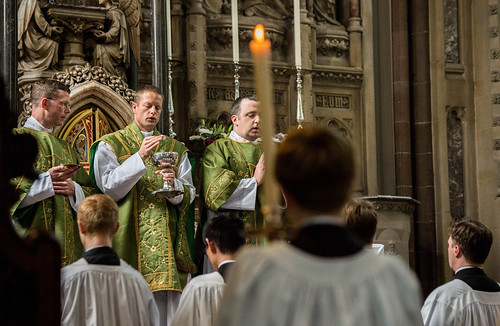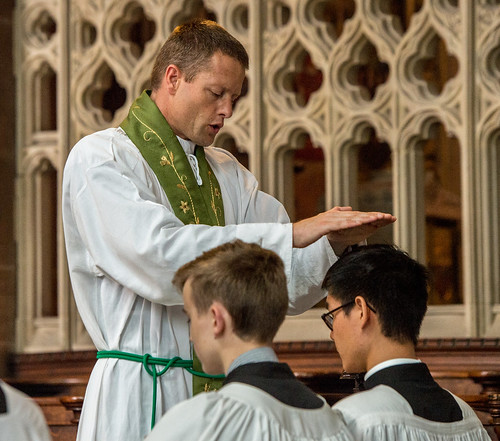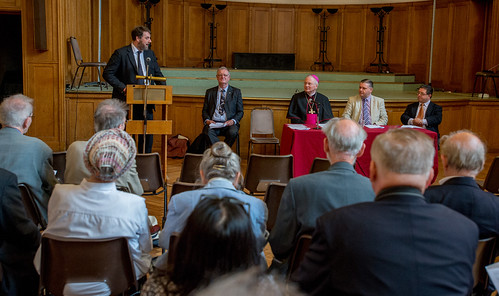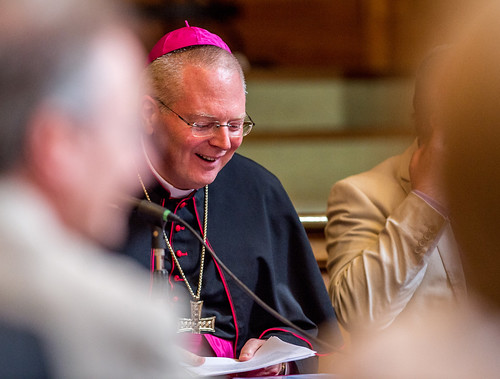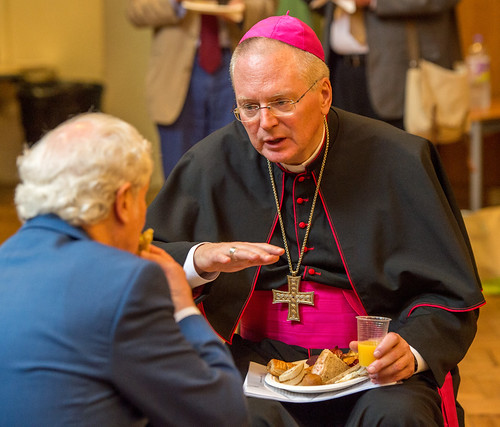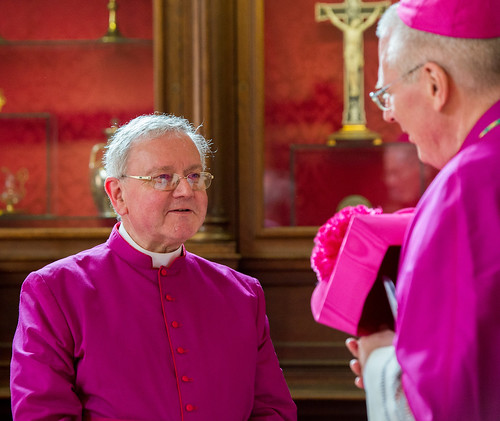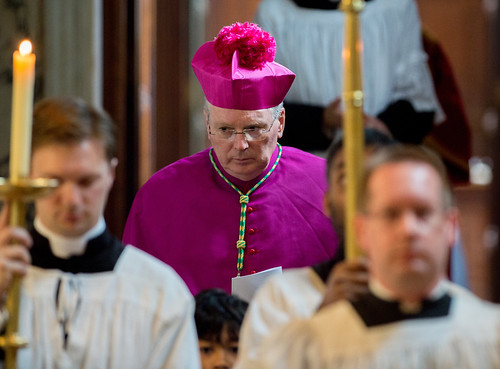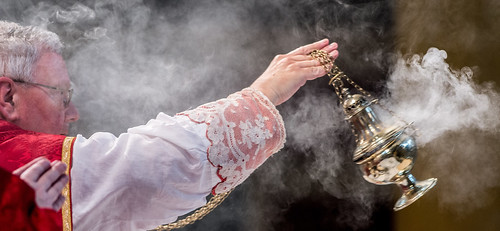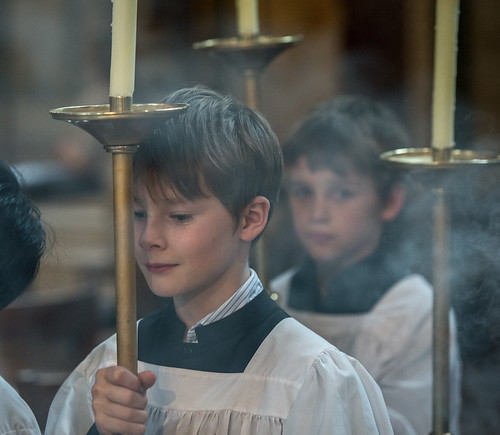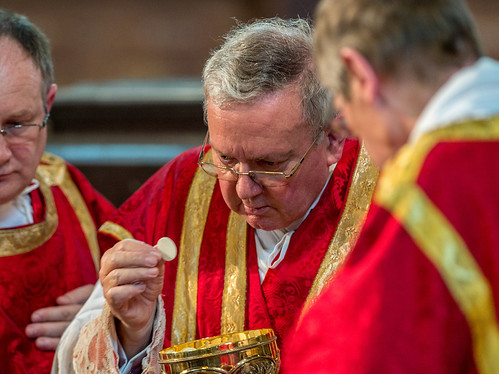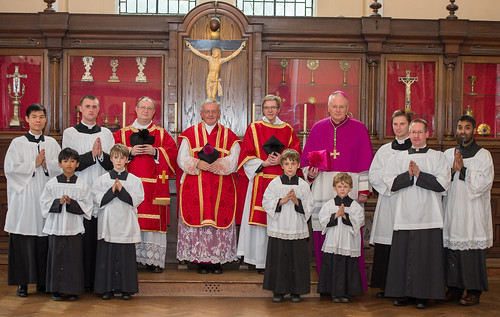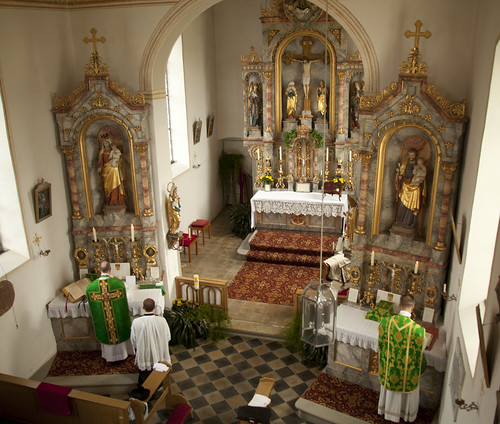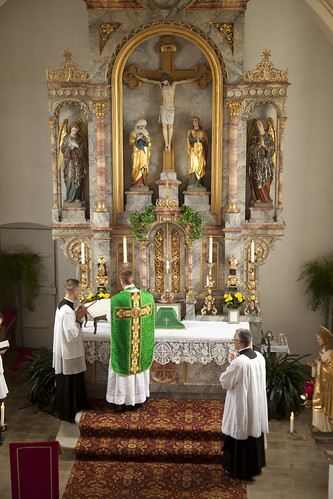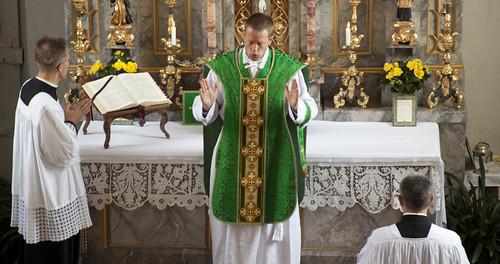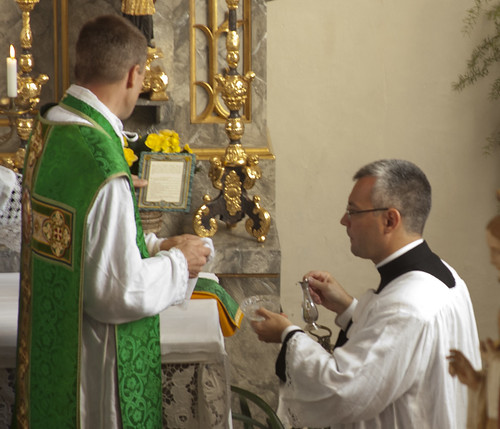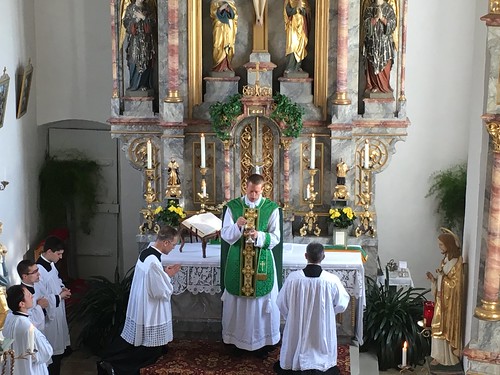Chairman's Blog
SPUC Conference
Details and booking here.

Support the work of the LMS by becoming an 'Anniversary Supporter'.
Video intereview with Gloria TV
Last October, when I was in Rome for the FIUV General Assembly and the Summorum Pontificum Pilgrimage, I was interviewed by Eva Doppelbauer of Gloria TV. Here is the result.
Support the work of the LMS by becoming an 'Anniversary Supporter'.
First High Mass for Fr Mawdsley: photos
Fr James Mawdsely celebrated a High Mass in St Mary's, Warrington, the FSSP church. As is usual at such Masses, because he is a new priest he has an 'assistant priest' (as a bishop does at Mass), so there are four sacred ministers, not just three.
Wednesday 13th July, 7pm.
Solemn High Mass at St Joseph’s, Gateshead, NE8 1LX.
Thursday 14th July, 12noon.
Low Mass at SS Joseph, Patrick & Cuthbert’s, Coxhoe, Co Durham, DH6 4DA.
Friday 15th July, 6pm.
Low Mass at St Andrew’s, Ravelston, Edinburgh, EH4 3DS.
Saturday 16th July, 12noon.
Solemn High Mass at the Church of the Immaculate Heart of Mary, 162 Broomfield Road, Glasgow G21 3UE.
Sunday 17th July, 11am.
Solemn High Mass at St William of York, Reading, RG1 5JP.
Support the work of the LMS by becoming an 'Anniversary Supporter'.
Cardinal Sarah on Liturgical Orientation
 It it always interesting to see arguments about liturgical orientation, the priest 'facing east' in Mass, since this is an important characteristic of the Church's liturgical tradition. Cardinal Sarah mentions it in a list of things which might be done to make celebrations of the Ordinary Form more worthy, along with a greater use of Latin, kneeling, and the discouragement of photography. It is not exactly a full-dress treatment of the issue, and nor is it new. In his talk he refers back to an article he wrote for Ossovatore Romano and the work of Pope Benedict. He could equally have referred to the writings of Cardinal Schonborn, who is quoted in the FIUV Position Paper on Liturgical Orientation. In this particular talk, Cardinal Sarah throws it out as a nice idea:
It it always interesting to see arguments about liturgical orientation, the priest 'facing east' in Mass, since this is an important characteristic of the Church's liturgical tradition. Cardinal Sarah mentions it in a list of things which might be done to make celebrations of the Ordinary Form more worthy, along with a greater use of Latin, kneeling, and the discouragement of photography. It is not exactly a full-dress treatment of the issue, and nor is it new. In his talk he refers back to an article he wrote for Ossovatore Romano and the work of Pope Benedict. He could equally have referred to the writings of Cardinal Schonborn, who is quoted in the FIUV Position Paper on Liturgical Orientation. In this particular talk, Cardinal Sarah throws it out as a nice idea:
This practice is permitted by current liturgical legislation. It is perfectly legitimate in the modern rite. Indeed, I think it is a very important step in ensuring that in our celebrations the Lord is truly at the centre. [Full text]
What is rather amazing, however, is the reaction to these remarks. Cardinal Nichols has written to his priests, the Vatican spokesman Fr Lombardi has made a statement, even Fr Spadaro SJ and Austen Ivereigh have felt the need to get in on the act: all with a view to contradicting the basic idea, that celebration facing east would be a good idea. Of course, they, like Cardinal Sarah, are all entitled to their opinions, and Cardinal Nichols is not just entitled, but obliged, to exercise prudential judgement in guiding his priests. The debate has been marred somewhat by a technical dispute over the correct translation of a passage in the General Instruction of the Roman Missal - this is the kind of tedious issue which those who are really interested can look up in a footnote in the Position Paper (see footnote 1). But let me say something about the bigger picture.
This debate is inevitable and intractable because both sides are right.
Cardinal Sarah, Pope Benedict, Cardinal Schonborn and Fr Michael Lang (in his book Turning Towards the Lord) are perfectly and undeniably correct that from a historical and theological perspective worship 'versus populum', facing the people, creates a problem. It doesn't invalidate the Mass or anything like that, but it is for practical purposes a massive rupture in historical continuity, for all the precedents which can be argued for it, and gives expression to a conception of the liturgy as (in the words of Pope Benedict) a 'closed circle', the community 'worshipping itself'.
Not only is this second point the impression gathered by those, like Pope Benedict, with an acute ear for what is going on in the liturgy, but it follows from what the supporters of vs. pop. celebration themselves say in its defence: that they want to engage face-to-face with the priest, that they prefer chairs-in-a-circle type celebrations, that they want to emphasise community, and so forth.
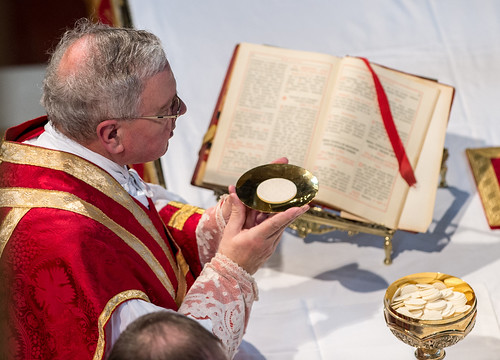 |
| Facing East to make the offereing. |
On the other hand, Cardinal Nichols, Fr Lombardi and the others are perfectly and undeniably correct that, for practical purposes, celebration vs. pop. is an integral part of the liturgical reform. Yes, celebrating the other way is allowed, as is celebrating in Latin. But in both cases the thrust of the post-conciliar documents is that these are things allowed for only in particular situations with particular justifications. For example, Latin is suggested for international gatherings. Celebration ad orientem is conceded, for example, where the altar cannot be moved away from the wall because of its historical or artistic value (see the Position Paper footnote 2).
Yes, it is true that the rubrics make reference to the priest turning around at certain points to face the people. (Fr Spadaro quoted one of these, apparently under the impression that it implied the celebrant faced the people all the time, when it does the opposite.) Well, they have to, if the concession is made that Mass can ever be celebrated ad orientem. And anyway, this is an amazingly weak argument. Just as--whatever Vatican II in Sacrosanctum Concilium said--Pope Paul VI told the world that the reform meant Mass in the vernacular, in the same way his big, media-event Mass to inaugurate the reformed Missal on the first Sunday of Advent 1969 was vs. pop.
Vs. pop. celebration is simply one aspect of a coherent programme of reforms which aimed at promoting a particular form of liturgical engagement. It goes with the use of easy-to-understand vernacular, the drastic reduction of the use of silent prayers by the celebrant, the replacement of the Church's musical patrimony with music the congregation can itself sing, the theological simplification of liturgical texts, and the shortening of lengthy ones. The multiplication of lay liturgical roles like readers and Eucharistic Ministers are a natural extension of the same idea. By all means let us discuss the success or failure of the project, by all means question the kind of participation being aimed at. But let's not pretend that there is a 'genuine reform', intended by some mysterious 'spirit of the Council', which comprises some of these elements and not others. They may not all have been mentioned in Sacrosanctum Concilium, and indeed official documents are in many instances in tension with each other, but they all pertain to a single conception of what liturgical participation means, and to this extent they stand and fall together.
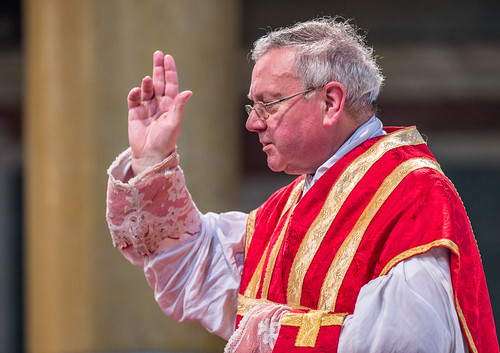 |
| Facing the people to give them a blessing. |
Those attached to the kind of liturgical participation brought in by the post-Conciliar reforms see, with varying levels of explicitness, worship ad orientem as a major step away from those reforms: and they are correct to do so. This is why attempts to introduce ad orientem can cause civil war in parishes. And the danger of civil war is one reason, I have no doubt, that it stimulates such a rapid response from people like Cardinal Nichols and Fr Lombardi.
The organisers of the Sacra liturgica conference, aiming to show that the Reform of the Reform agenda is still alive and kicking, have succeeded in showing just the opposite. There is absolutely no future in trying to inch back the reform in the teeth of this kind of opposition, any more than the First World War could be won by waves of infantry charging machine guns in order to gain territory a hundred yards at a time.
As I have argued on this blog before, it is a far simpler and generally more pastoral way forward for priests to introduce the Traditional Mass into the parish schedule, than to go to war over ad orientem and all the other issues in the Novus Ordo. Since, as I have argued, celebration versus populum is problematic, I admire and support priests who make the change to ad orientem in the Ordinary Form. What I can't do is defend them against the kinds of arguments which will inevitably be brought against them: that what they are doing is contrary to thrust of the post-Conciliar reform. Because it is.
I've written about the Death of the Reform of the Reform under its own label on this blog, and there are even more posts about the Reform of the Reform.
The turning around of the priest to greet the people during the Traditional Mass is itself an interesting topic, noted at the beginning of the Position Paper on the Kiss of Peace.
Support the work of the LMS by becoming an 'Anniversary Supporter'.
Photos of LMS AGM and Annual Mass in Westminster Cathedral
The AGM was addressed by Archbishop Thomas Gullickson, Nuncio to Switzerland and Lichtenstein.
Here he is chatting, over lunch, with one of the Latin Mass Society's Patrons, Lord Gill.
The Mass which followed the AGM was celebrated by our National Chaplain, Mgr Gordon Read. Archbishop Gullickson sat in choir.
Mgr Read was assisted by Fr Matthew Goddard FSSP (deacon), and Fr Mark Elliot Smith of the Ordinariate (subdeacon). We were blessed with three Fraternity seminarians in the serving team, including Matthew Palmer the Master of Ceremonies.
Support the work of the LMS by becoming an 'Anniversary Supporter'.
Catholic academics and pastors appeal to the College of Cardinals over Amoris laetitia
Press Release
Support the work of the LMS by becoming an 'Anniversary Supporter'.
High Mass for the Persecuted Church, in London, Friday 29th
 St Mary Moorfields, Friday 29th July, 7:30pm, High Mass celebrated by Fr Michael Lang Cong Orat. St Mary Moorfields is on Eldon Street at EC2M 7LS: click for a map.
St Mary Moorfields, Friday 29th July, 7:30pm, High Mass celebrated by Fr Michael Lang Cong Orat. St Mary Moorfields is on Eldon Street at EC2M 7LS: click for a map.
Support the work of the LMS by becoming an 'Anniversary Supporter'.
Book launch 20th July in London: Fr Lanzetta: Vatican II, a Pastoral Council
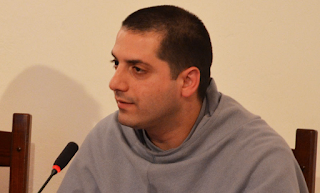 The Latin Mass Society is sponsoring a book launch in London for Fr Serafino Lanzetta's book: 20th July, from 6:30pm, in the basement of St Mary Moorfields, Eldon Street, London, concluding with Vespers at 8pm with the Schola Gregoriana of Cambridge.
The Latin Mass Society is sponsoring a book launch in London for Fr Serafino Lanzetta's book: 20th July, from 6:30pm, in the basement of St Mary Moorfields, Eldon Street, London, concluding with Vespers at 8pm with the Schola Gregoriana of Cambridge.Following the historical development of the idea of the council and its form (see the first chapter of my book), it is interesting to learn that it is not the juridical concept of “representation” (a council represents the Church) that defines a council in the strict sense – the conciliarists of the XIV century had mastered this concept in order to subordinate the Pope to the council – but rather the need, that was already felt at the first ecumenical council of Nicea, to defend the faith and to teach the truth: the greatest spiritual gift. The issue of a council has never been its infallibility, but the necessity to teach the truth.
Also those who see Vatican II as a break from Tradition, in my humble opinion, over-estimates the Council, dogmatising and infallibilising each of its doctrines, even those that are more dispositions or pastoral teachings relative to times, which were judged as new. If, in the judgement of some theologians, a solid biblical foundation is missing in order to establish, in the external forum, religious liberty as a foundation of a Christian State, from which “tolerance” towards the exercise of other religious cult is derived, how much more unsteady will such a biblical foundation be when one places all religions, because such, on the same level with regard to the exercise of cult in civil society, leaving to the laity the responsibility of announcing the Gospel to all? Does the State no longer have any obligation towards God and the religio vera? I refer, to the example of positive religious liberty (exercised in the external forum) because it is one of the most debated subjects, whereas negative religious liberty remains biblically and traditionally clear (no matter of faith can be forced on someone’s conscience). This is one of the topics, perhaps the most heated, that requires like others, greater elasticity. It is necessary for Vatican II to be both read and interpreted for what it is, according to its mens, and not according to a personal (political) inclination towards the ecclesiastical right or left-wing, or a subjective sensitivity towards the conservative or progressive. Already in 1968 Dietrich von Hildebrand proved that a mere contraposition between conservatism and progressivism is simply sterile: the point is either truth or prevarication, the truth or a “spiritual house of cards”.
For this purpose, based on other studies that have been published along the same line, it has been my desire to interrogate the Council as such. I have sought to re-discover – as far as it has been granted to me and save for a better judgement – the mens of the Vatican on certain key doctrines. The theologian is interested in understanding above all, so as to move with surety, the grade of magisterial teaching of the doctrines that we have before us. Precisely because this is not always clear, it is necessary to have recourse to a systematic study of the Council’s sources. The grade of magisterial teaching to which corresponds a theological note and on the other hand, a theological censure – I re-engage the topic of notes and censures that are so indispensable to the theological discussion –, with which to indicate a doctrine, allows us to examine the conciliar doctrines in a sure way; and there, where one finds the need because dealing with doctrines not yet definitively taught, to also be able to indicate some suggestions for an organic dogmatic progress, realised in any case by the Church’s magisterium. Upon examining these doctrines, which are among the most important and significant in the whole magisterial structure: Scripture-Tradition, members of the Church/belonging to the Church, episcopal collegiality, the mystery of the Blessed Virgin Mary in Christ and in the Church, I have reached the conclusion that we find ourselves before truths to which could be attributed the following theological note: “sententiae ad fidem pertinentes”, that is doctrines “upon which magisterium has not yet pronounced itself definitively, whose negation could lead to placing other truths of the faith in danger and whose truth is guaranteed by their intimate connection with revelation” (see pp. 423-432 of my book). A subsequent dogmatic development would still be possible for these doctrines, to reach the grade “definitive tenenda” and higher still, to their proclamation as dogma of faith. For a fair number of theologians in Council, only the question of the “sacramentality of the episcopate” is a definitive doctrine. Also on this point, however, there is no unanimity.
The verification of the so-called “mens Sanctae Synodus” could be seen by some as a light-hearted or even dangerous exercise, since it is up to the Magisterium to justify itself. Such a cutting off however, would abolish the very being of theology and contradict the repeated invites of the Council’s General Secretariat to read the proposed doctrines from the conciliar magisterium (not dogmatically defined nor held definitively, which would not require any interpretation because self-explanatory and would therefore be clear) with the spirit of the Council itself, a spirit that can be deduced from the subject dealt with and from the manner of expression, in accordance with the norms of theological interpretation.
The distinctiveness of my work consists in the fact that, with the aim of faithfully interpreting these doctrines of the Council, I avail myself of numerous first-hand sources. The numerous expert reports of theologians of the Doctrinal Commission were of great importance to my work, and which in the hierarchy of fonts, are to be placed at a much higher level than personal diaries, following straight after the Synodal Acts. They constitute the most authentic testimonies of what the theological mind of the Council prepared for the discussions, modifying or improving them based on the Council discussions, accepting or not the so-called modi presented by the Fathers. It is not hard to find the theological theses of various experts of the majority positions within the Commission. To follow the discussion of the Doctrinal Commission step-by-step is of great epistemic help in order to correctly evaluate the discussions of the Fathers in session. The Fathers frequently depended on their theologians, but their theology did not always depend on the Church’s Tradition. This is also a factor that one must bear in mind, and that can settle, so I think, many discussions that are still open regarding the correct hermeneutics of the Second Vatican Council.
Support the work of the LMS by becoming an 'Anniversary Supporter'.
Fr James Mawdsley FSSP: first Mass
I was last at Wigratzbad seven years ago, to attend the ordination of Fr William Barker FSSP, now living and working in Rome, in the Fraternity's church of Sta Trinita and at the Pontifical Commission Ecclesia Dei. Fr Barker celebrated his first Mass in the charming and tiny church of the village of Mywiler, and it was here, too, that Fr James Mawdsley celebrated his own first Mass. Here are my photos.
(At this point my camera developed a glitch.)
Support the work of the LMS by becoming an 'Anniversary Supporter'.
Masses for Anthea Craigmyle
 For the record, anyone wishing to attend Mass for Anthea Craigmyle can do so as follows.
For the record, anyone wishing to attend Mass for Anthea Craigmyle can do so as follows.
Monday 18th July, 11am: Church of the Immaculate Conception, Farm Street (address: 114 Mount St, London W1K 3AH: click for a map). Ordinary Form Requiem Mass, followed by a reception.
Tuesday 19th July, 11am: Chiswick New Cemetery (address: Staveley Road W4 2SJ: click for a map). Traditional Sung Mass and burial. Mass will be in the cemetery's mortuary chapel; parking is available next to it.
(If you're coming from the Hogarth Roundabout, head West down Burlington Lane, following signs for the M3 and Kew. Burlington Lane turns into Great Chertsey Road, and a little later you turn right onto Staveley Road at a junction with traffic lights. The cemetery is immediately on your left.)
Wednesday 18th August, 11am: the Little Oratory, at the London Oratory (address: Brompton Rd, London SW7 2RP: click for a map). The 'month's mind', Traditional High Mass accompanied by Oratory singers, who will sing Anerio's Requiem. The 'Little Oratory' is not in the main church, but the other side of the small car park.
These are public services, everyone is welcome to attend.
I would like to record my thanks for the many Masses offered already or to be offered soon by the family's many priest friends. We are truly blessed in your generosity.
Support the work of the LMS by becoming an 'Anniversary Supporter'.

